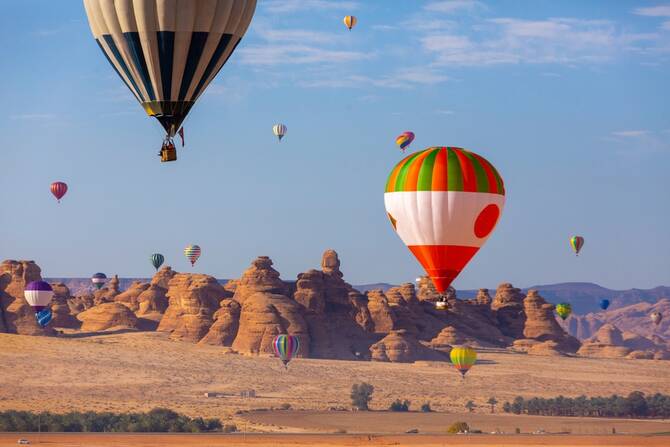RIYADH: Saudi Arabia’s tourism sector achieved a historic milestone in 2024, with international tourism revenue surging 148 percent compared to 2019 — the highest growth rate among G20 nations.
This achievement reflects the success of Vision 2030, which has firmly positioned the Kingdom as a global leader in tourism, entertainment, and innovation.
The 2024 annual performance report highlighted record-breaking pilgrim numbers, cultural milestones, and major international events, all driven by strategic investments, regulatory reforms, and transformative mega-projects.
Tourism boom
Vision 2030 unlocked Saudi Arabia’s vast tourism potential, establishing it as one of the fastest-growing global destinations.
In 2024, international tourist arrivals surged to 29.7 million, up from 18.04 million in 2016, while domestic travelers nearly doubled to 86.2 million during the same period.
Surpassing its target of 100 million visitors seven years ahead of schedule, the Kingdom has now set a bold new goal of attracting 150 million annual tourists by 2030.
Saudi Arabia’s tourism strategy is driven by mega-projects aiming to transform the travel and hospitality industry.
Pioneering projects like The Red Sea — home to carbon-neutral resorts including Shebara, St. Regis, and Ritz-Carlton Nujuma — are redefining sustainable luxury tourism. The adjacent Red Sea International Airport, the region’s first carbon-neutral terminal, strategically connects over 250 million people within a three-hour flight radius.
In Diriyah, the birthplace of the first Saudi state, 3 million visitors experienced a seamless blend of heritage and hospitality, with developments like the Bab Samhan Hotel offering modern luxury rooted in history.
Meanwhile, at Qiddiya, major entertainment attractions are nearing completion, with Aquarabia Park 81 percent finished and Six Flags Park 87 percent completed.
The Kingdom’s global tourism profile continues to rise, with accolades including AlUla being named Best Cultural Tourism Project in the Middle East, Madinah ranking among the world’s top 100 destinations, and the Asir region earning four awards for excellence in culinary and cultural storytelling.
To enhance accessibility, the Kingdom expanded its e-visa program to 66 countries by 2024, simplifying entry for millions of travelers.
Additionally, Saudi Arabia has emerged as a global leader in safety, ranking highest among G20 nations in security indicators, further solidifying its reputation as a welcoming and secure destination for international visitors.
Pilgrimage services
Serving pilgrims remains a cornerstone of Saudi Arabia’s responsibilities. Vision 2030 has transformed the Hajj and Umrah experience into a model of efficiency, accessibility, and safety.
In 2024, the Kingdom welcomed 16.9 million foreign Umrah pilgrims and 1.61 million foreign Hajj pilgrims, reflecting significant growth from 2016 levels.
Innovations like the Makkah Route Initiative, which fast-tracks visa issuance and pre-clearance in eight countries, served 322,900 pilgrims in 2024 — a rise from just 1,700 in 2017.
The Nusuk platform played a key role in improving pilgrimage planning, helping achieve an 81 percent satisfaction rate on the Pilgrim Experience Index. Transportation infrastructure, including the Haramain High-Speed Railway, the Makkah Bus Network, and the Al-Mashaer Metro Line, facilitated the movement of 69.5 million passengers between holy sites.
The Kingdom’s commitment to pilgrims’ well-being is evident in its healthcare services. In 2024, 390,000 pilgrims received medical care, and 40,000 medical staff were mobilized. Adding to that, 189 hospitals, centers, and mobile clinics were deployed, and 28 open-heart surgeries and 720 cardiac catheterizations were performed.
About 153,000 volunteers supported pilgrimage operations in 2024, up from just 3,352 in 2021, showcasing the growing culture of community service.
Hosting mega-events
Saudi Arabia’s global influence expanded across sports, esports, and entertainment in 2024.
The Kingdom secured the rights to host the 2034 FIFA World Cup, which will feature 48 national teams competing across 15 stadiums in Riyadh, Jeddah, NEOM, Al Khobar, and Abha.
The tournament will be backed by 134 training facilities and 230,000 hotel units, contributing to infrastructure development, job creation, and long-term economic impact.
In the digital realm, Saudi Arabia hosted the inaugural Esports World Cup, the largest tournament of its kind, featuring 1,500 professional players, 500 elite clubs, and 22 competitions. Team Falcons emerged as champions, and the Kingdom further solidified its leadership by winning hosting rights for the Olympic Esports Games.
Meanwhile, Riyadh Season 2024 drew 19 million visitors, with a total attendance of 76.9 million across 423 entertainment attractions.
The festival featured top-tier performances, immersive themed zones, and vibrant cultural displays, reinforcing its reputation as a global entertainment event.
Cultural renaissance
Vision 2030 has revitalized Saudi Arabia’s cultural identity, merging ancient heritage with modern creativity.
The Kingdom now boasts eight UNESCO World Heritage Sites, including the newly listed Al-Faw Archaeological Site, and 16 UNESCO Intangible Cultural Heritage elements celebrating traditions like Arabic calligraphy, Saudi coffee, and falconry.
Groundbreaking discoveries such as the Bronze Age Village of Al-Natah in AlUla have further illuminated the region’s rich history.
In arts and entertainment, the critically acclaimed film "Norah" became the first Saudi production selected for the Cannes Film Festival’s official lineup, while the Kingdom’s first Arabic opera, Zarqa Al Yamama, premiered to acclaim.
The King Salman Global Academy for Arabic Language trained 782 international students, promoting Arabic language and culture across three continents.
Economic impact
Tourism is a major driver of Saudi Arabia’s economic diversification, with sector employment reaching 966,500 workers in 2024, up from 683,000 in 2020. Women now play a critical role, with 112,000 Saudi women employed in tourism, marking a 67 percent increase.
Investment in the sector has surged from $314.67 million in 2021 to $3.95 billion by the third quarter of 2024, fueling massive infrastructure expansion, including the Kingdom’s hospitality capacity growing to 475,900 hotel rooms.































